Support strong Canadian climate journalism for 2025
Canada’s premiers and prime minister met under tense circumstances in Montreal Friday, and left a day of meetings without a shared agenda on energy or the environment.
Before the meetings, Ontario Premier Doug Ford threatened not to come to the table at all. New Quebec Premier François Legault made clear his province isn’t interested in reviving the Energy East pipeline, despite New Brunswick’s interest and Alberta’s struggling oil and gas sector. And the Alberta government purchased ads in Quebec newspapers Friday morning pointing to its website keepcanadaworking.ca, which advocates the expansion of the Trans Mountain pipeline and claims each day the pipeline is delayed represents a loss of nearly $8 billion in revenue for the country.
Heading into the meeting Friday morning, Alberta Premier Rachel Notley called her government’s interim mandatory cuts to oil production “a sign that things aren’t working very well.”
Speaking to reporters afterwards, Notley explained that most premiers were sympathetic to the impact of tumbling oil prices on Alberta, though she acknowledged that Legault has made it clear that he would like his province to move away from oil dependency.
Finance Minister Bill Morneau told reporters that he felt the discussions on the subject were “positive and engaged,” and said the federal government wants to work with Alberta and Saskatchewan.
However, no tangible solutions came out of the meeting.
“We don’t have the answers yet,” Notley said.
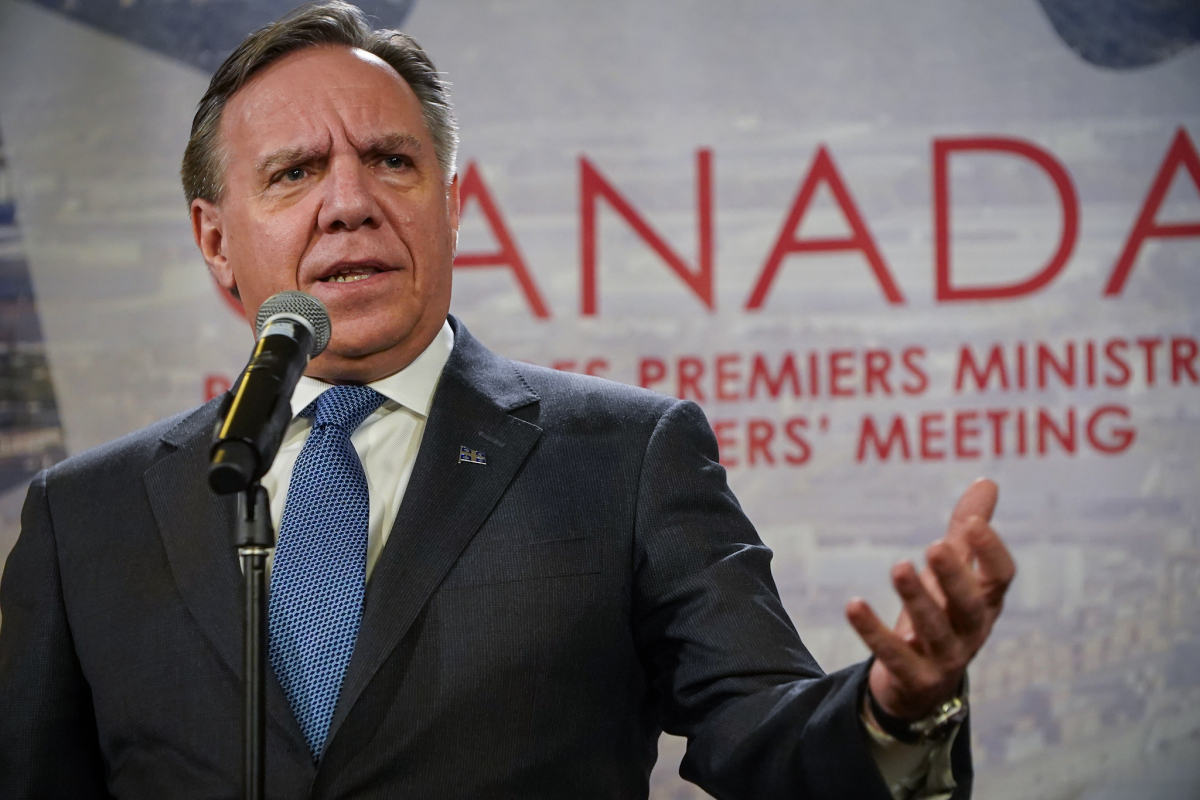
A new pipeline in Quebec ‘not socially acceptable’
Newly-elected New Brunswick Premier Blaine Higgs arrived in Montreal hoping to discuss the prospect of reviving Energy East with his provincial counterparts.
He was met with steadfast opposition from Legault, who insisted that “it is not socially acceptable” to have a pipeline pass through Quebec’s borders.
Legault continuously brought the focus back to Quebec’s surplus of hydroelectricity, arguing that like Alberta oil, Quebec hydro needs more avenues for export. He said he would not hesitate to refuse “dirty energy” due to having access to a cleaner source of power.
The almost $16 billion TransCanada Energy East project was abandoned last year, costing the company $1 billion. The proposed pipeline was to transport 1.1 million barrels of oil a day 4,500 kilometres from Alberta and Saskatchewan through to New Brunswick.
Despite Higgs’s interest, Prime Minister Justin Trudeau said that at the moment, there is no plan for an eastbound pipeline on the table after TransCanada dropped the project.
Earlier this year, Trudeau’s government purchased the westbound Trans Mountain pipeline after its owner, Kinder Morgan, threatened to abandon that project.
Without offering specifics, Trudeau also acknowledged that they will be entering discussions to explore how electric energy could be transferred between the provinces and territories.
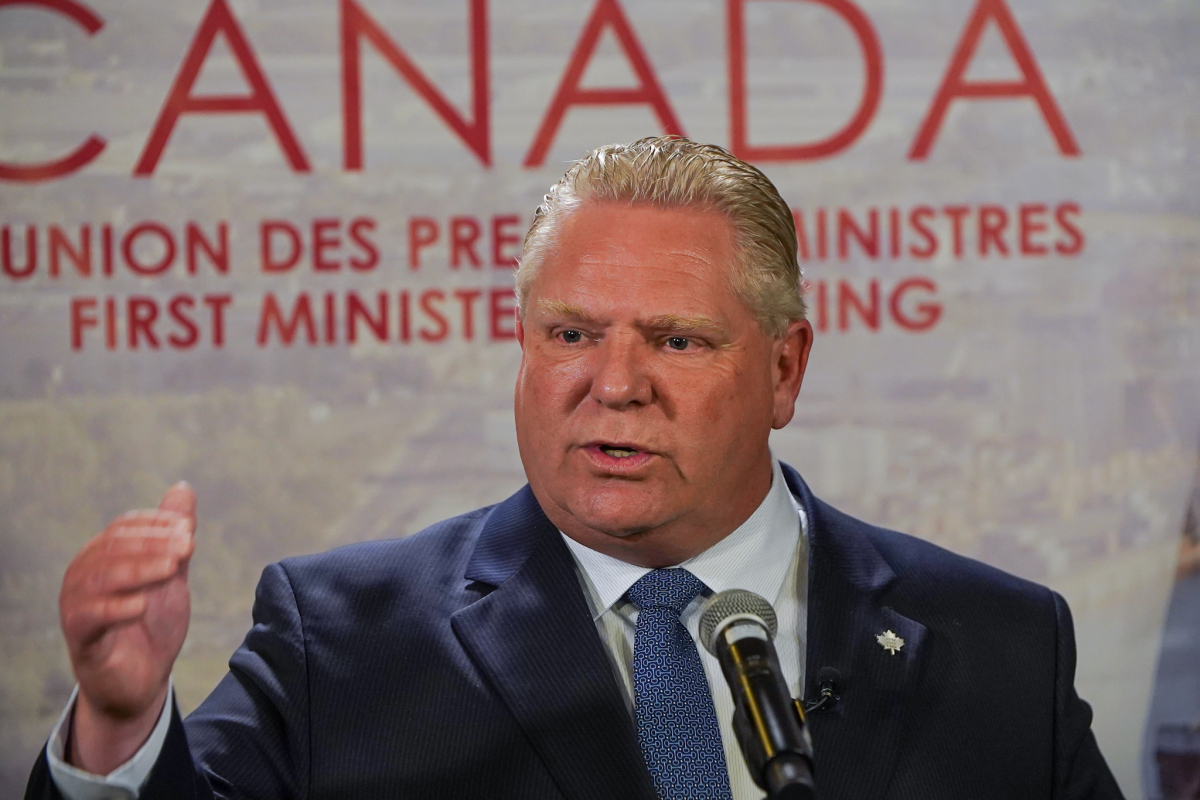
Environmental policy takes centre stage
At the head of the meeting, Trudeau praised Quebec for its cap-and-trade system – a joint market for buying and selling emission credits that Ontario was a part of until Ford was elected.
Trudeau described the system, which now joins just Quebec and California, as “a successful market-based approach to reducing pollution,” and stressed that the environment and “clean growth” must remain a priority for all provinces.
“After all, future generations, our kids and grandkids, are counting on us as leaders to act,” he said.
Talks around greenhouse gas emissions, however, became a point of contention when some premiers insisted that goalposts for reductions had been moved farther away for some provinces.
To meet its obligations to the Paris climate agreement, Canada needs to reduce its emissions by 30 per cent below 2005 levels by 2030.
Ford claims that during the meeting, Trudeau said certain provinces will have to “carry more water than other provinces.” That, Ford said, is a punishment for Ontarians and “sets uncertainty in our economy.” He maintained that Ontario was on track to meet the 30 per cent target.
“This is not what we have agreed to,” said Saskatchewan Premier Scott Moe, echoing Ford’s account of the meeting
Others, however, disputed the pair’s claims that the prime minister had mandated Ontario to meet greater greenhouse gas reductions in order to make up for other provinces.
“Everyone in that room was committed to meeting the emission standards and the targets for 2030,” said Higgs. “There’s no confusion about the goal, the confusion is how to get there.”
“We did not move the goalpost,” federal Environment Minister Catherine McKenna insisted. Rather, she criticized Ford’s position on climate policy, saying he “does not have a credible climate plan.”
Trudeau went further, saying Ford’s climate plan represents “a step backwards,” and that “if anyone is moving goalposts, it’s Premier Ford.”



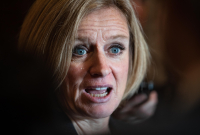
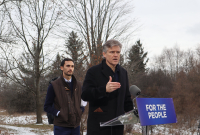
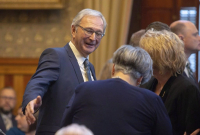
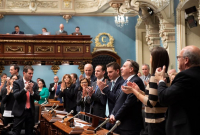
Comments
Mr. Trudeau's plan is a few steps backwards. Why? Please tell me why he is giving the real polluters (big oil and gas) a bye on taxes...in fact they are given incentives in the form of subsidies and tax breaks to encourage an increase of ever more fossil fuel extraction and marketing. He said we can't leave it in the ground. What about future generations. There will still be a need for many products created from oil that we will still need such as plastics. A visionary Mr. Trudeau is not. Betrothed to big oil? In my opinion he is.
It's the neo-liberal way. It's very similar to the "privatize profits and socialize losses" credo. Except here it's "socialize energy conservation, probably with penalties attached for non-compliance and privatize profitable exploitation, probably including increased subsidies and tax write-offs". Individual citizens of all classes (except for the very wealthy) will be expected to shoulder all the responsibility, all the cost, all the privation and all the risk while corporate citizens, particularly those in the oil and gas sector, will grow wealthier and even more influential as they purchase the loyalty of more and more political parties - including the NDP as demonstrated by the Notley crowd in Edmonton.
Gilet jaunes may be just the early onset.